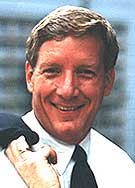Kelley Announces for U.S. Senate
By Martin Kaste
October 20, 1999
State Senator Steve Kelley has added his name to the list of DFLers vying to challenge U.S. Senator Rod Grams in 2000. Kelley calls himself a "pragmatic" Democrat who believes in limited government, but he says he also wants to spend more money on things like education and Social Security.
STEVE KELLEY has adopted a campaign style that might be dubbed "celtic-futurism." His campaign color is bright green, right down to his shiny green necktie, and his campaign logo consists of a shooting star orbiting the green "Kelley" name. In the Legislature, Kelley established himself as an expert on telecommunications and technology, and he says he'll carry that same forward-looking emphasis into this Senate race.
Kelley says he's not comfortable with ideological labels like "liberal" or even "Wellstone Democrat." He's also noncommittal about whether he'll honor the endorsement of the DFL party convention, which tends to pick left-of-center candidates. DFL candidate Mike Ciresi has also said he might not abide by the endorsement, a situation which could lead to another bruising primary battle for Democrats next fall, replaying their divisions in last year's governor's race.
The Republicans, meanwhile, have maintained a united front behind their
man, incumbent Senator Rod Grams. DFL state chairman Mike Erlandson says he will
try to encourage Democratic candidates to keep the good of the party in mind.
By Martin Kaste
October 20, 1999
|
|
RealAudio 3.0 |
State Senator Steve Kelley has added his name to the list of DFLers vying to challenge U.S. Senator Rod Grams in 2000. Kelley calls himself a "pragmatic" Democrat who believes in limited government, but he says he also wants to spend more money on things like education and Social Security.
| |
|
|
|
||
STEVE KELLEY has adopted a campaign style that might be dubbed "celtic-futurism." His campaign color is bright green, right down to his shiny green necktie, and his campaign logo consists of a shooting star orbiting the green "Kelley" name. In the Legislature, Kelley established himself as an expert on telecommunications and technology, and he says he'll carry that same forward-looking emphasis into this Senate race.
Kelley: We're moving into a new millennium, with a new kind of economy, and we need someone who can work for Minnesota families, who understand the new economy and can take that message from here to Washington and can put it to work.Kelley's says his "new economy" philosophy means smaller government.
Kelley: There is a role for government, but it should be a narrower role, and we should use the market when we can to accomplish our goals.There are limits to Kelley's "smaller government" approach. For example, he opposes the conversion of Social Security funds into stock market investments, a plan backed by Senator Rod Grams. And despite his pledge to reduce the national debt, Kelley says he believes in more government spending on certain areas.
Kelley: If our nation were a family, we'd make the same sound decisions a Minnesota family makes every day. Feeling a little more financially secure, a Minnesota family would sit around the kitchen table and decide what they could afford to do to make life a little easier, a little better. The family would put some extra money into extra education for the children. maybe a computer, some extra classes, maybe music lessons.Besides education, Kelley also favors more government help for worker training, health care and affordable housing.
Kelley says he's not comfortable with ideological labels like "liberal" or even "Wellstone Democrat." He's also noncommittal about whether he'll honor the endorsement of the DFL party convention, which tends to pick left-of-center candidates. DFL candidate Mike Ciresi has also said he might not abide by the endorsement, a situation which could lead to another bruising primary battle for Democrats next fall, replaying their divisions in last year's governor's race.
| |
|
|
|
| |
|
Erlandson: I guess the real challenge for a candidate is for them to evaluate their own campaign, and if they're not the front runner, if they're not catching on, if they're not raising money, then they have to take a deep look on the inside and say, "Maybe I shouldn't be in this race, because I'm just hurting the Democratic party."Erlandson says it's still too early for Democrats to start taking themselves out of the race, but he says that process should start happening as early as January. And the DFL field will probably get bigger before it shrinks: another state senator, Jerry Janezich of Chisholm, says he's 70 percent sure he's going to run, too.

